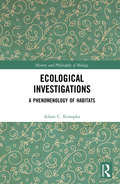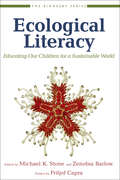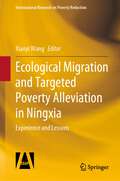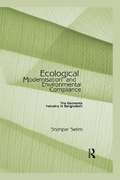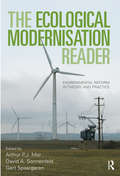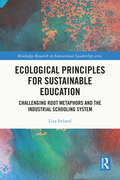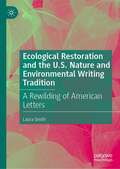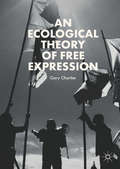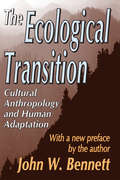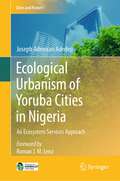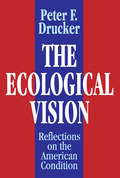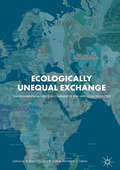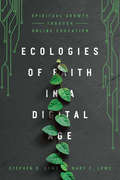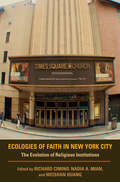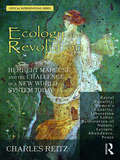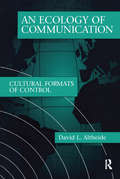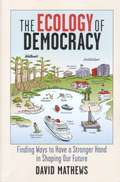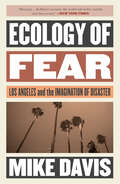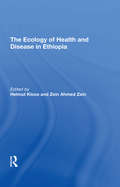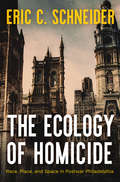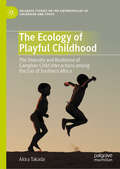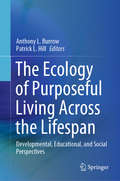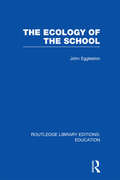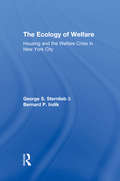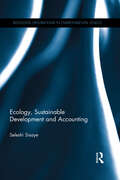- Table View
- List View
Ecological Investigations: A Phenomenology of Habitats (History and Philosophy of Biology)
by Adam C. KonopkaThese investigations identify and clarify some basic assumptions and methodological principles involved in ecological explanations of plant associations. How are plants geographically distributed into characteristic groups? What are the basic conditions that organize groups of interspecific plant populations that are characteristic of particular kinds of habitats? Answers to these questions concerning the geographical distribution of plants in late 19th century European plant geography and early 20th century American plant ecology can be distinguished according to differing logical assumptions concerning the habitats of plant associations. Through an analysis of several significant case studies in the early history of plant ecology, Konopka distinguishes a logic of habitats that conceives of plant associations in an analogy to individual organisms with a logic that conceives of plant associations in a reciprocal relation to habitat physiography. He argues that a phenomenological conception of the logical attributes of habitats can philosophically complement the physiographic tradition in early plant ecology and provide an attractive alternative to standard reductionism and holism debates that persist today. This wide ranging and original analysis will be valuable for readers interested in the history and philosophy of ecology.
Ecological Literacy
by Fritjof Capra David W. Orr Zenobia Barlow Michael K. StoneReorienting the way human beings live on the earth and educating children to their highest capacities have much in common, say the thinkers and educators behind this groundbreaking book. Both endeavors must be viewed and pursued in the context of systems: familial, geographic, ecological, political. And our efforts to build sustainable communities cannot succeed unless future generations learn how to partner with natural systems to our mutual benefit. In other words, they must become "ecologically literate."The concept of "ecological literacy" advanced by this book's creators, the Center for Ecoliteracy in Berkeley, California, extends beyond the discipline of environmental education. It aims, as David W. Orr writes in his foreword, "toward a deeper transformation of the substance, process, and scope of education at all levels."The reports and essays gathered in the book reveal the remarkable work being conducted by the Center's extensive network of partners. In one middle school, for example, culinary icon Alice Waters founded a program that not only provides students with healthy meals but teaches them to garden-and thus to study life cycles and energy flows-as part of their curriculum. Other hands-on student projects supported by the Center and described in the book range from stream restoration and watershed exploration to confronting environmental justice issues at the neighborhood level.With contributions from distinguished writers and educators, such as Fritjof Capra, Wendell Berry, and Michael Ableman, Ecological Literacy marries theory and practice based on the best thinking about how the world actually works and how learning occurs. Parents and educators everywhere who are engaged in creative efforts to develop new curricula and improve children's ecological understanding will find this book to be an invaluable resource.
Ecological Migration and Targeted Poverty Alleviation in Ningxia: Experience and Lessons (International Research on Poverty Reduction)
by Xiaoyi WangThis book assesses Ecological Migration and Precision Poverty Alleviation Measures, based on research conducted in Ningxia. “Resettling residents currently living in poor areas” is an important measure for “precise poverty alleviation.” China’s central government has provided extraordinary support for these areas, so as to help with “removing poverty nests,” “changing poverty industries,” and “pulling out the roots of poverty.”This book is mainly based on research conducted in Ningxia, one of the earliest areas in China to achieve poverty alleviation and development through immigration and relocation. Since the Twelfth Five-Year Plan, Ningxia’s ecological migration has been integrated into the process of new urbanization and industrialization. Poverty alleviation and relocation not only involves regional transfer, industrial transformation, and changes in livelihood, but also the social adaptation and integration of migrant groups. In addition to examining these aspects, the book shares stories of how impoverished individuals have succeeded in changing their fates.
Ecological Modernisation and Environmental Compliance: The Garments Industry in Bangladesh
by Shahpar SelimEconomic development that is environmentally, socially and ethically sound is at the forefront of contemporary debates all over the world. This is especially relevant to international trade where goods manufactured in least developed countries (LDCs) are being exported to developed countries (DCs) via international supply chains. This book looks at Bangladesh’s ready-made garments (RMG) industry – the seventh largest in the world — facing demands for environmental and social management according to standards set by consumers in environmentally progressive societies. Apart from these concerns not having found cultural or institutional resonance in Bangladesh, the pressures for cost reduction, on-time delivery and cheap labour in a highly competitive international market make the problem that much more complex. In this book Selim uses the analytical framework provided by the ecological modernisation theory to examine the economic, communicative and social political aspects of ethical trade, and argues that the economy-ecology relationship can indeed be a positive sum game if nation-states and economic actors change their policymaking styles and greening behaviour to take advantage of scientific evidence and green technological opportunities.
The Ecological Modernisation Reader: Environmental Reform in Theory and Practice
by Arthur P.J. MolStructural environmental reform by firms and industries, governmental and intergovernmental agencies, non-governmental organisations (NGOs), and others is a worldwide phenomenon and the focus of this definitive collection. Includes a comprehensive introduction to and overview of Ecological Modernisation Theory; original, state-of-the-art review essays by distinguished international scholars; a selection of the best published works and debates from a quarter-century of related social science scholarship; an emphasis on environmental issues in Asian and other emerging economies; and an agenda for continued scholarship, policymaking, and practice. Accessible to students, policymakers, professionals, executives, and others interested in deeply understanding contemporary environmental issues and taking effective action for environmental solutions. Rigorous and sophisticated for use in graduate and advanced studies. Appropriate for courses in Sociology, Political Science, Policy Studies, Geography, Environmental Studies, Environmental Planning, Business, Economics, Asian Studies, Development Studies, and other fields.
Ecological Principles for Sustainable Education: Challenging Root Metaphors and the Industrial Schooling System (Routledge Research in Educational Leadership)
by Liza IrelandThis book explores how the education sector can transition to being truly sustainable and why necessary innovations for educational change are being subverted and undermined when mapped onto the existing industrial educational system.Based on PhD case study research with schools that are modelling and teaching sustainability, action research, and the author’s 40 years of working in the K-12 system, this volume examines how education continues to perpetuate the status quo, and why education innovations are thus undermined. It shows the importance of redesigning education based on the principles of sustainable living systems and explores how this can be achieved across all levels of the educational system. The first part of the book establishes a new vision of sustainable education, whilst the second brings to light the industrial mechanistic root metaphors in current practice across leadership and administration, buildings and grounds, curriculum design, teaching, and learning that are subverting innovative efforts. From understanding the foundational, influential, problematic root metaphors of our "Industrial" educational system, it moves to explore how the ecological principles of sustainability can be used to rethink and redesign an educational system, from its administration, leadership, and policy, to curriculum, buildings, grounds and resources, through to teaching and learning, that will support sustainability, innovation, and creativity, developing systems thinking and sustainability as a frame of mind.Exploring how the education sector can transition to being truly sustainable and find new ways to traverse the problematic "Industrial" world view at this pivotal moment, will appeal to administrators, post-secondary educators, policymakers, and researchers and scholars of sustainability education, educational leadership, curriculum design, and educational philosophy.
Ecological Restoration and the U.S. Nature and Environmental Writing Tradition: A Rewilding of American Letters
by Laura SmithThis book presents a critical history of the intersections between American environmental literature and ecological restoration policy and practice. Through a storying—restorying—restoring framework, this book explores how entanglements between writers and places have produced literary interventions in restoration politics. The book considers the ways literary landscapes are politicized by writers themselves, and by conservationists, activists, policymakers, and others, in defense of U.S. public lands and the idea of wilderness. The book profiles five environmental writers and examines how their writings on nature, wildness, wilderness, conservation, preservation, and restoration have variously inspired and been translated into ecological restoration programs and campaigns by environmental organizations. The featured authors are Henry David Thoreau (1817–1862) at Walden Pond, John Muir (1838–1914) in Yosemite National Park, Aldo Leopold (1887–1948) at his family’s Wisconsin sand farm, Marjory Stoneman Douglas (1890–1998) in the Everglades, and Edward Abbey (1927–1989) in Glen Canyon. This book combines environmental history, literature, biography, philosophy, and politics in a commentary on considering (and developing) environmental literature’s place in conversations on restoration ecology, ecological restoration, and rewilding.
An Ecological Theory of Free Expression
by Gary ChartierThis book advances a comprehensive moral defense of freedom of expression—one with implications for law and policy, but also for the choices of individuals and non-governmental institutions. Gary Chartier seeks to ground expressive freedom in mutually supportive concerns related to themes including property, autonomy, flourishing, and discovery, while seeking to tightly cabin the range of potential injuries that might trigger legal liability for expressive activity. Chartier argues suggestively for an understanding of expressive freedom as rooted and realized in a complex set of social ecosystems that merit protection on multiple grounds and applies it provocatively to a range of contemporary issues.
The Ecological Transition: Cultural Anthropology and Human Adaptation
by John W. BennettWritten during the height of the ecology movement, The Ecological Transition is a stunning interdisciplinary work. It combines anthropology, ecology, and sociology to formulate an understanding of cultural-environmental relationships. While anthropologists have been studying relationships between humans and the physical environment for a very long time, only in the last thirty years have questions inherent in these relationships broadened beyond description and classification. For example, the concept of environment has been extended beyond the physical into the social.Although anthropologists have adopted many of the concepts that Bennett develops in the book, he also feels that the central issues have never been addressed, either by anthropologists or by people in related disciplines. The most important of these, in Bennett's opinion, is the failure to incorporate a respect for the environmental in contemporary culture, which would allow making exceptions in certain human practices in order to protect the environment. His point in The Ecological Transition is that a basic cultural change in modern civilization is necessary to achieve this end.Both a theoretical and a practical work, The Ecological Transition emphasizes the relationships between human culture, the physical environment, technology, and social policy. The Ecological Transition is a challenging volume that makes us face the consequences of human behavior in the modern world: its effect on pollution, natural resources, agriculture, the economy, and population, to name just a few areas. The book remains a significant contribution to the discourse on social, economic, and environmental problems. While the book was first published in 1976, it still reads as a contemporary tract.
Ecological Urbanism of Yoruba Cities in Nigeria: An Ecosystem Services Approach (Cities and Nature)
by Joseph Adeniran AdedejiThis book offers in-depth ethnographic analyses of key informants’ interviews on the ecological urbanism and ecosystem services (ES) of selected green infrastructure (GI) in Yoruba cities of Ile-Ife, Ibadan, Osogbo, Lagos, Abeokuta, Akure, Ondo, among others in Southwest Nigeria. It examines the Indigenous Knowledge System (IKS) demonstrated for wellbeing through home gardens by this largest ethno-linguistic group in Nigeria. This is in addition to the ES of Osun Grove UNESCO World Heritage Site, Osogbo; Biological Garden and Park, Akure; Lekki Conservation Centre, Lagos; Adekunle Fajuyi Park, Ado-Ekiti; Muri Okunola Park, Lagos; and some institutional GI including University of Ibadan Botanical Gardens, Ibadan; Federal University of Agriculture Abeokuta Botanical Garden, Abeokuta; and University of Lagos Lagoon Front Resort, Lagos, Nigeria. The study draws on theoretical praxis of Western biophilic ideologies, spirit ontologies of the Global South, and largely, Millennium Ecosystem Assessment (2005) to examine eco-cultural green spaces, home gardens, and English-types of parks and gardens as archetypes of GI in Yoruba traditional urbanism, colonial and post-colonial city planning. The book provides methods of achieving a form of modernized traditionalism as means of translating the IKS into design strategies for eco-cultural cities. The strategies are framework, model, and ethnographic design algorithms that are syntheses of the lived experiences of the key informants.
The Ecological Vision: Reflections on the American Condition
by Peter F. DruckerPeriods of great social change reveal a tension between the need for continuity and the need for innovation. The twentieth century has witnessed both radical alteration and tenacious durability in social organization, politics, economics, and art. To comprehend these changes as history and as guideposts to the future, Peter F. Drucker has, over a lifetime, pursued a discipline that he terms social ecology. The writings brought together in The Ecological Vision define the discipline as a sustained inquiry into the man-made environment and an active effort at maintaining equilibrium between change and conservation.The chapters in this volume range over a wide array of disciplines and subject matter. They are linked by a common concern with the interaction of the individual and society, and a common perspective that views economics, technology, politics, and art as dimensions of social experience and expressions of social value. Included here are profiles of such figures as Henry Ford, John C. Calhoun, Soren Kierkegaard, and Thomas Watson; analyses of the economics of Keynes and Schumpeter;and explorations of the social functions of business, management, information, and technology. Drucker's chapters on Japan examine the dynamics of cultural and economic change and afford striking comparisons with similar processes in the West.In the concluding chapter, "Reflections of a Social Ecologist," Drucker traces the development of his discipline through such intellectual antecedents as Alexis de Tocqueville, Walter Bagehot, and Wilhelm von Humboldt. He illustrates the ecological vision, an active, practical, and moral approach to social questions. Peter Drucker summarizes a lifetime of work and exemplifies the communicative clarity that are requisites of all intellectual enterprises. His book will be of interest to economists, business people, foreign affairs specialists, and intellectual historians.
Ecologically Unequal Exchange: Environmental Injustice in Comparative and Historical Perspective
by Harry F. Dahms R. Scott Frey Paul K. GellertAt a time of societal urgency surrounding ecological crises from depleted fisheries to mineral extraction and potential pathways towards environmental and ecological justice, this book re-examines ecologically unequal exchange (EUE) from a historical and comparative perspective. The theory of ecologically unequal exchange posits that core or northern consumption and capital accumulation is based on peripheral or southern environmental degradation and extraction. In other words, structures of social and environmental inequality between the Global North and Global South are founded in the extraction of materials from, as well as displacement of waste to, the South. This volume represents a set of tightly interlinked papers with the aim to assess ecologically unequal exchange and to move it forward. Chapters are organised into three main sections: theoretical foundations and critical reflections on ecologically unequal exchange; empirical research on mining, deforestation, fisheries, and the like; and strategies for responding to the adverse consequences associated with unequal ecological exchange. Scholars as well as advanced undergraduate and graduate students will benefit from the spirited re-evaluation and extension of ecologically unequal exchange theory, research, and praxis.
Ecologies of Faith: Spiritual Growth through Online Education
by Stephen D. Lowe Mary E. LoweMany Christian institutions have embraced new technologies, especially online education. But is it possible for us to grow spiritually through our digital communities? Steve Lowe and Mary Lowe, longtime proponents of online education, trace the motif of spiritual growth through Scripture and consider how students and professors alike might foster digital ecologies in which spiritual transformation can take place.
Ecologies of Faith in New York City: The Evolution Of Religious Institutions
by Weishan Huang Nadia A. Mian Richard CiminoEcologies of Faith in New York City examines patterns of interreligious cooperation and conflict in New York City. It explores how representative congregations in this religiously diverse city interact with their surroundings by competing for members, seeking out niches, or cooperating via coalitions and neighborhood organizations. Based on in-depth research in New York's ethnically mixed and rapidly changing neighborhoods, the essays in the volume describe how religious institutions shape and are shaped by their environments, what new roles they have assumed, and how they relate to other religious groups in the community.
Ecology and Revolution: Herbert Marcuse and the Challenge of a New World System Today (Critical Interventions)
by Charles ReitzA timely addition to Henry Giroux’s Critical Interventions series, Ecology and Revolution is grounded in the Frankfurt School critical theory of Herbert Marcuse. Its task is to understand the economic architecture of wealth extraction that undergirds today’s intensifying inequalities of class, race, and gender, within a revolutionary ecological frame. Relying on newly discovered texts from the Frankfurt Marcuse Archive, this book builds theory and practice for an alternate world system. Ecology and radical political economy, as critical forms of systems analysis, show that an alternative world system is essential – both possible and feasible – despite political forces against it. Our rights to a commonwealth economy, politics, and culture reside in our commonworks as we express ourselves as artisans of the common good. It is in this context, that Charles Reitz develops a GreenCommonWealth Counter-Offensive, a strategy for revolutionary ecological liberation with core features of racial equality, women’s equality, liberation of labor, restoration of nature, leisure, abundance, and peace.
Ecology of Communication
by David L. AltheideAltheide's new book advances the argument set in motion some years ago with Media Logic and continued in Media Worlds in the Postjournalism Era: that in our age, information technology and the communication enviroments it posits have affected the private and the social spheres of all our power relationships, redefining the ground rules for social life and concepts such as freedom and justice., Articulated through an interactionist and non-deterministic focus, An Ecology of Communication offers a distinctive perspective for understanding the impact of information technology, communication formats, and social activities in the new electronic environment.
The Ecology Of Democracy: Finding Ways To Have A Stronger Hand In Shaping Our Future
by David MathewsThe work of democracy is work. Here are some ideas about how it can be done in ways that put more control in the hands of citizens and help restore the legitimacy of our institutions.
Ecology of Fear: Los Angeles and the Imagination of Disaster
by Mike DavisA witty and engrossing look at Los Angeles' urban ecology and the city's place in America's cultural fantasiesEarthquakes. Wildfires. Floods. Drought. Tornadoes. Snakes in the sea, mountain lions, and a plague of bees. In this controversial tour de force of scholarship, unsparing vision, and inspired writing, Mike Davis, the author of City of Quartz, revisits Los Angeles as a Book of the Apocalypse theme park. By brilliantly juxtaposing L.A.'s fragile natural ecology with its disastrous environmental and social history, he compellingly shows a city deliberately put in harm's way by land developers, builders, and politicians, even as the incalculable toll of inevitable future catastrophe continues to accumulate.Counterpointing L.A.'s central role in America's fantasy life--the city has been destroyed no less than 138 times in novels and films since 1909--with its wanton denial of its own real history, Davis creates a revelatory kaleidoscope of American fact, imagery, and sensibility. Drawing upon a vast array of sources, Ecology of Fear meticulously captures the nation's violent malaise and desperate social unease at the millennial end of "the American century." With savagely entertaining wit and compassionate rage, this book conducts a devastating reconnaissance of our all-too-likely urban future.
The Ecology Of Health And Disease In Ethiopia
by Helmut Kloos Zein Ahmed ZeinThis book examines prevailing human health problems in political, socioeconomic, cultural, and physical/biotic settings of health practitioners and planners in Ethiopia. It also evaluates modern and traditional health resources and examines the occurrence of nonvectored communicable diseases.
The Ecology of Homicide: Race, Place, and Space in Postwar Philadelphia
by Eric C. SchneiderLike so many big cities in the United States, Philadelphia has suffered from a strikingly high murder rate over the past fifty years. Such tragic loss of life, as Eric C. Schneider demonstrates, does not occur randomly throughout the city; rather, murders have been racialized and spatialized, concentrated in the low-income African American populations living within particular neighborhoods. In The Ecology of Homicide, Schneider tracks the history of murder in Philadelphia during a critical period from World War II until the early 1980s, focusing on the years leading up to and immediately following the 1966 Miranda Supreme Court decision and the shift to easier gun access and the resulting spike in violence that followed.Examining the transcripts of nearly two hundred murder trials, The Ecology of Homicide presents the voices of victims and perpetrators of crime, as well as the enforcers of the law—using, to an unprecedented degree, the words of the people who were actually involved. In Schneider's hands, their perspectives produce an intimate record of what was happening on the streets of Philadelphia in the decades from 1940 until 1980, describing how race factored into everyday life, how corrosive crime was to the larger community, how the law intersected with every action of everyone involved, and, most critically, how individuals saw themselves and others. Schneider traces the ways in which low-income African American neighborhoods became ever more dangerous for those who lived there as the combined effects of concentrated poverty, economic disinvestment, and misguided policy accumulated to sustain and deepen what he calls an "ecology of violence," bound in place over time.Covering topics including gender, urban redevelopment, community involvement, children, and gangs, as well as the impact of violence perpetrated by and against police, The Ecology of Homicide is a powerful link between urban history and the contemporary city.
The Ecology of Playful Childhood: The Diversity and Resilience of Caregiver-Child Interactions among the San of Southern Africa (Palgrave Studies on the Anthropology of Childhood and Youth)
by Akira TakadaWhile studies of San children have attained the peculiar status of having delineated the prototype for hunter-gatherer childhood, relatively few serious ethnographic studies of San children have been conducted since an initial flurry of research in the 1960s and 1970s. Based on the author’s long-term field research among several San groups of Southern Africa, this book reconsiders hunter-gatherer childhood using “play” as a key concept. Playfulness pervades the intricate practices of caregiver-child interactions among the San: immediately after birth, mothers have extremely close contact with their babies. In addition to the mother’s attentions, other people around the babies actively facilitate gymnastic behavior to soothe them. These distinctive caregiving behaviors indicate a loving, indulgent attitude towards infants. This also holds true for several language genres of the San that are used in early vocal communication. Children gradually become involved in various playful activities in groups of children of multiple ages, which is the major locus of their attachment after weaning; these playful activities show important similarities to the household and subsistence activities carried out by adults. Rejuvenating studies of San children and hunter-gatherer childhood and childrearing practices, this book aims to examine these issues in detail, ultimately providing a new perspective for the understanding of human sociality.
The Ecology of Purposeful Living Across the Lifespan: Developmental, Educational, and Social Perspectives
by Anthony L. Burrow Patrick L. HillThis book explores what it means to live a purposeful life and outlines the benefits associated with purpose across different life domains. It also demonstrates that purpose in life is not reducible to constructs such as happiness, well-being, or identity development.The importance of having a sense of purpose in life is attracting renewed attention in both scientific and social arenas. Mounting evidence from intricately designed experiments and large-scale studies reveals how pursuing a purpose can make a person happier, healthier, and even lengthen their lifespan. However, existing texts on purpose have said little on why having has these effects, how it may influence our ability to navigate diverse environments, or how best to consider the construct from a multidisciplinary approach that moves beyond psychology.Recognizing this gap in the literature, this book provides multidisciplinary perspectives on the topic of purpose, and examines what we can do as researchers, interventionists, and society as a whole to imbue purposefulness in the lives of people across the lifespan. It includes contributions from key figures on topics such as identity, health, youth programs and youth purpose, diversity, aging and work.
The Ecology of the School (Routledge Library Editions: Education)
by John EgglestonWithin a single educational system – that of England and Wales – the nature of schooling available to a child can be dramatically different. Even between residential areas the differences in educational climate can be striking. Apart from differences in the organization of schools and the availability of buildings, teachers and resources, there are also significant ideological variations between local education authorities. This book considers the evidence of such differences, some of the environmental factors (political, social and economic) that may account for their distribution, and the consequences that appear to spring from them.
The Ecology of Welfare: Housing and the Welfare Crisis in New York City
by George SternliebThe basic ecology of human groups—the relationship between the distribution of population and material resources and the resultant social and cultural patterns—is a subject which has occasioned far more talk than down-to-earth research. Filling this gap, George Sternlieb and Bernard Indik consider one dimension of human ecology— the interplay between housing and outlook, between the physical realities of a dwelling unit and the attitudes and responses of its inhabitants. Their book, The Ecology of Welfare, presents a detailed description of the housing and housing problems of one special subgroup-New York City's welfare recipients in the 1970's.
Ecology, Sustainable Development and Accounting (Routledge Explorations in Environmental Studies)
by Seleshi SisayeAccounting literature has viewed sustainability in terms of social, economic and environmental performances. There have been concerns that the relationship between sustainability, accounting and organizational performance cannot be explained unless we can deduce patterns of administrative behaviour that chronicle management practices. Ecology, Sustainable Development and Accounting argues that, despite the broader social and economic development dimensions of sustainability and the limitations of its extension to corporate and organizational behaviour; an ecological framework is capable of providing the overall societal and community chronologies that describe corporate sustainable operations. Drawing examples from international development and federal government organizations, this book documents the link between ecology, corporate sustainable development, and sustainability accounting and reporting. It draws together the literature from several disciplines to elaborate the contribution of the ecological approach to sustainable development in the accounting literature. This book will be of particular interest to students, academics and practitioners in the areas of environmental studies, ecological economics, sustainable development studies, and social and environmental accounting. The sociological and anthropological perspectives make this book the first of its kind to apply the population ecology of sociology to both the sustainability and accounting literature.
